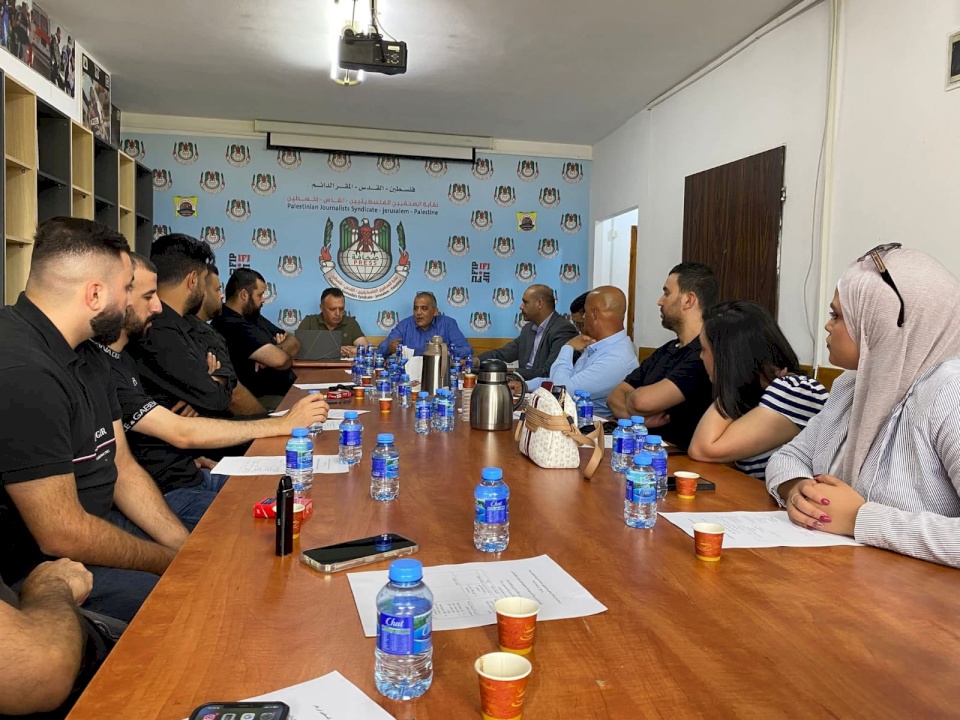
Journalists' Syndicate Discusses Establishing Trade Union Branches and Enhancing Representation of Independent Journalists
SadaNews - The Palestinian Journalists' Syndicate discussed, in Ramallah and Gaza over the course of three days, mechanisms for establishing trade union branches both inside and outside the homeland, in addition to enhancing the representation of independent journalists within the syndicate structures, in partnership with the International Federation of Journalists under the "From Union to Union" program.
The head of the Palestinian Journalists' Syndicate, Nasser Abu Bakr, emphasized the importance of workshops and the significance of the meetings, which were divided into three parts. The first focused on issues related to journalists working independently and the mechanisms for their engagement and representation in the trade union structures; the second was dedicated to developing trade union representation and establishing branches of the syndicate; and the third was a research meeting for union leaders discussing the history of the international trade union movement and its current programs and the foundations of journalists' unions and their programs.
He pointed out that the establishment of branches is a response to the decisions of the general conference of the syndicate held in May 2023, stressing the importance of founding these branches to enhance organizational structures and provide a wider space for representation and trade union work that takes into account the uniqueness and needs of each region. He also referred to several international models that adopt similar representative mechanisms.
He clarified that the syndicate places great importance on journalists working independently and the mechanisms for their engagement and representation within union structures, hence several meetings with independent journalists have been held to mature the idea of a committee representing them and following their issues within the trade union committees.
On his part, the Director of Policies and Programs for the Arab World and the Middle East at the International Federation of Journalists, Munir Zaarour, reviewed during the workshops the current trade union structure of the Palestinian Journalists' Syndicate, highlighting international and regional experiences in establishing branches and decentralized structures for journalists' unions, pointing out the importance of aligning geographical representation with the effectiveness of trade union work, and the possibility of benefiting from international models to formulate regulatory bylaws for the creation of branches as an urgent necessity.
He provided a comprehensive presentation during the independent journalists' workshop regarding international experiences and the risks they face, emphasizing the need to work according to specific priorities to ensure their representation and protect their rights within a clear mechanism and structure.
Zaarour also addressed the challenges facing the trade union work and trade union institutions amidst rapid changes in the market and in digital fields during the workshop on the history of the international trade union movement.
Union leadership from the General Secretariat and the Administrative Council from the West Bank, Gaza, and the diaspora participated in the workshops. In the first workshop, the work of the group of independent journalists was discussed concerning the fundamental challenges they face, such as legal issues, labor rights, and professional rights like copyright, publishing, and intellectual property rights. The workshop recommended forming a working group to develop a mechanism for representing independent journalists.
The second workshop, which focused on developing trade union representation and establishing trade union branches, included a presentation about the trade union structure of the Journalists' Syndicate, discussions, and decisions regarding the establishment of trade union branches, as well as presentations about the structures and organizational frameworks of journalists' unions in the region and around the world, and research questions about the appropriate trade union structure and the nature of the branches the syndicate seeks to establish and what their powers are.
The third workshop, aimed at union leadership, revolved around the history of the international trade union movement, its current programs, and the foundations of the work of journalists' unions and their programs, the emergence of unions and the international trade union movement, unions in political economy, the international trade union movement and its structure, the mechanisms and primary tools of trade union work, and the current work program of the international trade union movement regarding youth, organizing in the informal work sector, just transition, the new social contract, and trade union organization in the digital economy sector.
It also focused on the work program of the International Federation of Journalists regarding its objectives, program components, trade union organization and campaigns, strengthening international trade union solidarity, leading the fight for journalists' safety and resisting impunity, promoting gender equality, strengthening regional organizations, ensuring good governance, and providing a trade union approach to organizing the journalism sector and protecting journalists' rights.

Kashif Observatory Concludes Specialized Training in Information Verification for Palestin...

Awqaf: 28 incursions into Al-Aqsa and 57 prohibitions on the call to prayer at the Ibrahim...

Civil Organizations: Opening the Rafah Crossing Does Not End the Tragedy.. The Internation...

Settlers Cut Down Dozens of Olive Saplings in Bourin South of Nablus

Occupations Extends Its Aggression on Tulkarem and Nur Shams Camps Until the End of March...

Al-Natsheh: The Eighth General Conference of 'Fatah' Must Be a Step Forward Towards Revivi...

Occupation Forces a Jerusalemite to Demolish His Home in Silwan

